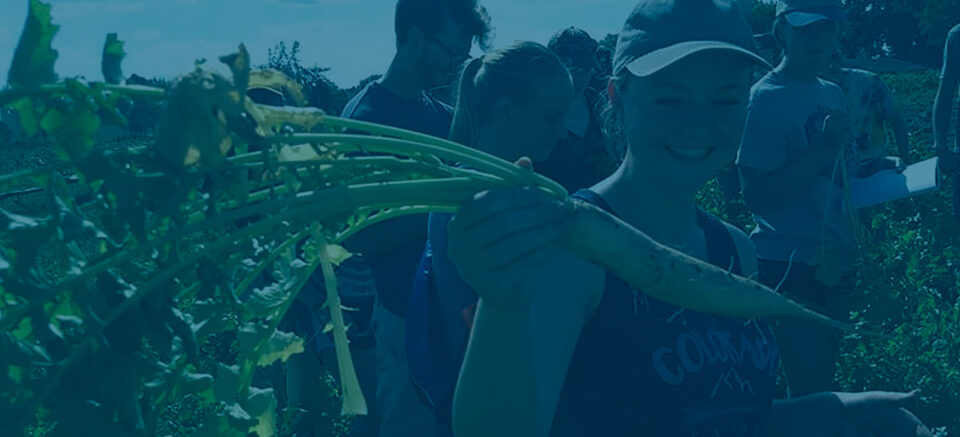
Food, Agriculture, and Society
Re-imagine global and local food systems
At Macalester, we take an interdisciplinary approach to the pressing problem of hunger across the globe.
We don’t just talk about farming. Our interdisciplinary approach to agriculture sets us apart from other liberal arts colleges. You’ll take courses that examine food from the lenses of geography, economics, geology, political science, religion, history, and international studies, to name a few. You might look at the history and effectiveness of food stamps in the United States; or study how food is central to religious practices; or travel to Botswana to conduct research with your professor—and then write and publish articles together. This interdisciplinary perspective of food and agriculture is crucial to developing more sustainable and equitable food systems. Our students go on to change the face of agriculture, both in the United States and abroad.
Why Macalester? Location.
At Macalester, you won’t simply read about food and agriculture in a textbook. Macalester’s urban location helps you apply knowledge in a hands-on, real-world way. Our students have interned at food banks, conducted research at farmer’s markets, examined immigrant communities involved in agriculture, and studied food deserts in the Twin Cities. As a hotbed for organic and local food movements, Minnesota hosts one of the greatest concentrations of organic farms in the nation. Students take field trips to a community-supported agriculture (CSA) farm to learn (and taste!) how it works. Using ingredients from the farm, they bake pizza in outdoor ovens.
Recent student projects
- Chacra Farming, Peasant Livelihood Portfolios and Wellbeing in the Peruvian High Andes
- Correcting for the Inconveniences of Cultivation: Foraging as a Food Source in Southwestern Burkina Faso
- Farmer discontent in periurban Bangalore: The utopia of agricultural modernization, neoliberal developmentalism and the 21st century global city
A sample of course offerings
- People, Agriculture and the Environment
- Food Chemistry
- Economics of Global Food Problems
- Food Politics and Policy in America
- World to Table: Global Food Studies
- Food and Culture
- Nineteenth-Century British Literature: Feasts and Famines
- Religion and Food
- Food in French and Francophone Cultures: the Local and the Global
- Soil, Science & Sustainability
- Food, Science, and Technology in Interwar Europe, 1914-1945
Life after Macalester
A concentration in Food, Agriculture, and Society paves the way to careers in farming, food and agricultural policy, food ethics, food bank management, famine prevention and early warning, international development, crop science and genetics, soil science, and more.
-
Recent Employers - Peace Corps
- U.S. Environmental Protection Agency
- Minnesota Department of Agriculture
- Whetstone Farm
- U.S. Department of Agriculture
-
Recent Graduate Schools - Graduate School in geography, environmental studies and economics
Learning in the Cities
200+
Number of internship sites within 8 miles of campus, including General Mills and an alumni urban farm Stone’s Throw
Several international agro-industrial firms are nearby, like Land O’Lakes and General Mills, ideal for studying food both in and out of the classroom
29
Number of farmers markets that are near campus (plus 124 beekeepers)
Join our community
- MULCH (Macalester Urban Land and Community Health) – Grow vegetables in our community garden, tend to chickens, and create a more sustainable urban landscape.
- Community potlucks – Socialize with students, professors, alumni, and community members.
- Empty Bowls Fundraiser – Raise awareness of hunger issues in our community and fight food injustice through art.
- MacSHARE – Access locally-sourced organic food and produce at an affordable price. This student grocery cooperative purchases high quality, sustainable food in bulk and sells it to Macalester students for a reduced rate.
- MacFEAST – Join a student organization dedicated to increasing awareness surrounding food issues.
Links for Current Students
- To declare a Food, Agriculture, and Society concentration, please contact the concentration director.